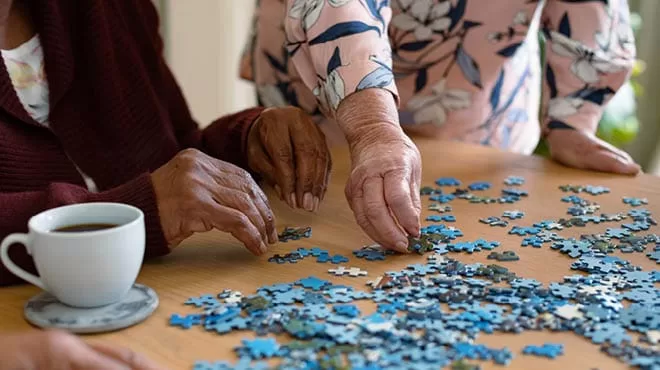Your brain is one of the most important organs in your body, and it is undeniably precious too. More and more research suggests that people might be able to lower their risk of cognitive decline by making some changes to their lifestyles. As you get older, it’s natural for your body and brain to go through some transitions.
On the other hand, there are some things that you can do to help slow down any deterioration in memory and to lower your risk of acquiring Alzheimer’s disease or other dementias. But some types of memory problems that happen over and over again are more worrying. Because of this, you should do everything you can to stop these problems from happening in the first place.
Memory, on the other hand, is only a very small portion of how the brain functions, and there are many things that you can do to keep your brain healthy. However, it is possible to avoid many of these risk factors for vascular disease.

Adopting a healthy lifestyle can help reduce or get rid of risk factors like high blood pressure, diabetes, and being overweight. If you already have one or more of these risk factors, you might be able to enhance your brain’s health by making adjustments to your lifestyle that can help reverse the symptoms and improve your overall health.
1. Exercise regularly.
Regular physical activity has been shown to have positive effects on both the body and the mind, including cognitive function. Multiple studies have shown that people who are physically active on a regular basis have a lower chance of getting Alzheimer’s disease and are less likely to lose their mental ability as they age.
These benefits come right from the fact that exercise increases blood flow to your brain. It also tends to reverse some of the bad things that come with getting older, like the loss of brain connections that usually happens with that process.
Aim to get at least 30 to 60 minutes of activity on most days of the week. You can get your heart rate up by going for a walk, swimming, playing tennis, or engaging in any number of other moderate aerobic activities.
According to research, exercising your muscles has a positive effect on your thinking. When an animal is physically active on a regular basis, the number of tiny blood vessels that bring oxygen-rich blood to the part of the brain that is in charge of thinking grows.
Also, regular exercise encourages the growth of new nerve cells and strengthens the connections (synapses) between brain cells that are already there. This makes the brains of older animals more effective, flexible, and able to change, which helps them do better as they get older. Exercise is good for your heart and brain because it lowers blood pressure, improves cholesterol levels, helps keep blood sugar levels in a healthy range, and reduces mental stress.
2. Make sure you get enough rest.
Getting enough sleep is critical to maintaining a healthy brain. Several theories say that sleep helps your brain get rid of abnormal proteins and consolidate memories, both of which are good for your memory and the health of your brain as a whole.
Instead of sleeping in two- or three-hour chunks throughout the night, you should aim to get seven to eight continuous hours of sleep each night. Your brain needs a certain amount of time to organize and store your memories. Sleeping without interruption gives your brain that time. Sleep apnea is dangerous to the health of your brain and could be the reason why you have trouble sleeping for more than a few hours at a time. If you or a loved one suspects you have sleep apnea, you should see a doctor as soon as possible.
3. Adopt the diet of the Mediterranean region.
The condition of your brain is significantly influenced by the foods you eat. Consider adopting a diet similar to that of the Mediterranean region, which places an emphasis on plant-based foods, whole grains, fish, and healthy fats like olive oil. In comparison to a traditional American diet, it has far less salt and red meat.
Several studies have shown that people who follow a Mediterranean diet more closely have a lower chance of getting Alzheimer’s disease than those who don’t. More research is needed to figure out which parts of a healthy diet are most important for better brain function. On the other hand, we know that the omega-3 fatty acids found in extra-virgin olive oil and other healthy fats are important for the proper functioning of your cells, that they may reduce the risk of coronary artery disease, that they may improve mental focus, and that they may slow cognitive decline in older adults.
4. Maintain a state of mental activity.
Your brain is like a muscle in that it will atrophy if it is not put to work. Reading, solving logic puzzles like crosswords or Sudoku, playing card games, or putting together jigsaw puzzles are all great tips for healthy mind and active. Other options include conducting word searches or Sudoku. Think of it as doing different things for your brain. To be more successful, do a lot of different things.
Any activity that challenges your mind in some way should be beneficial to the development of your brain. You should read, go to school, and do “mental gymnastics” like crossword puzzles and math problems. Try your hand at activities that demand both cerebral and physical work, such as drawing, painting, and other types of crafts.
Most medical care teams do not encourage people to join any of the paid brain-training programs that are already available. These programs often make claims about what they can do that aren’t true, or they focus on memory techniques that don’t help in the real world. Reading or challenging yourself with puzzles are both excellent ways to exercise your brain in the same way that playing Sudoku does. Last but not least, limit the amount of time you spend in front of the television because it is a sedentary pursuit that offers no mental challenge.

Scientists have found through studies with both mice and people that activities that keep the brain busy help nerve cells make new connections and may even help the brain make new cells. This helps build “plasticity” in the brain and a functional reserve, which protects against losing more brain cells in the future.
5. Continue to be active in your social life.
It has been found that having strong social ties is connected not only with a lower incidence of dementia but also with lower blood pressure and a longer life expectancy.
Interacting with others helps stave off feelings of depression and stress, both of which are known to play a role in memory loss. If you live by yourself, it is extremely important to look for opportunities to interact with loved ones, friends, and other people. Research shows that being locked up alone can cause your brain to shrink. On the other hand, having regular social interactions may have the opposite effect and make your brain healthier.
6. Ensure that your blood vessels are in good shape.
In addition to being important for the health of your heart, keeping your arteries and veins in good shape is also important for the health of your brain. Check your blood pressure, blood sugar, and cholesterol levels on a regular basis and take the necessary steps to keep them within a healthy range.
Your blood pressure and cholesterol levels can be lowered by reducing the amount of salt you consume, increasing the amount of physical exercise you get, and following a diet similar to that of the Mediterranean. Last but not least, using tobacco and alcohol can also hurt your brain’s health. Because of this, you should drink less alcohol and stop smoking completely. Women should not drink more than one alcoholic drink per day, and men should not drink more than two alcoholic drinks per day.
7. Never smoke, and consume less alcohol.
According to the Alzheimer’s Association, if you smoke, it is best to quit, and if you drink, it is best to do so only in moderation. Both smoking and drinking too much put you at an elevated risk of dementia. If you drink, it is better to drink only in moderation.
According to the Dietary Guidelines for Americans, men shouldn’t drink more than two drinks per day, and women shouldn’t drink more than one drink per day on days when they drink. A “drink” is equal to one bottle of beer (12 ounces), one bottle of malt liquor (8 ounces), one bottle of wine (5 ounces), or one and a half ounces of distilled spirits or liquor.
A study done in 2022 and published in July found that people who drink more than seven units of alcohol per week have higher levels of iron in their brains, which are linked to lower levels of cognitive function. These findings highlight the significance of keeping your alcohol consumption at a moderate level. Seven units of alcohol are about the same amount as you can find in three standard glasses of wine or four standard bottles of beer.

Bottom Line
In the medical literature, there is more and more evidence that poor physical health is linked to declining mental health. According to the findings of this study, vascular risk factors can be harmful to the health of your brain, which can impair your ability to think clearly and potentially lead to changes that are similar to those seen in Alzheimer’s disease and dementia.
When you can, combine these practices to gain the greatest possible benefit for both your body and your brain. Begin right away. When it comes to developing healthy routines, there is no such thing as being too late or too early. In that case, let’s go ahead and make these life-altering routines part of your everyday practice.
Disclaimer:
The author’s views are his or her own. The facts and opinions in the article have been taken from various articles and commentaries available in the online media and Eastside Writers does not take any responsibility or obligation for them.
Note: Contact our Writers at www.eastsidewriters.com for writing Blogs/Articles on any niche. We have experts in various domains from Technology to Finance and from Spirituality to Lifestyle and Entertainment.







Pingback: Why CoQ10 Is The Drug Of Choice For Many When It Comes To Health Management - Eastside Writers
Pingback: The autoimmune disease Systemic Lupus and its serious consequences - Eastside Writers
Pingback: Unlocking the Secrets of Brain Hormones: Understanding How These Powerful Chemical Messengers Regulate Your Body's Functions - Eastside Writers
Pingback: The ABCs of Parkinsonism: Understanding Symptoms and Treatment Options - Eastside Writers